RES421: Civil Law Assignment - Contract, Agency and Property Law
VerifiedAdded on 2022/10/12
|14
|3224
|354
Homework Assignment
AI Summary
This assignment provides an analysis of several key areas within civil law. Task 1 focuses on the law of contracts, defining a contract, its essential elements, and the requirements for a valid agreement of sale and purchase of real estate. It also explores scenarios involving offers, acceptances, and the discharge of contracts through performance, agreement, frustration, and breach. Task 2 delves into property law, examining the Joint Family Homes Act 1964 and its implications for property ownership, enduring power of attorney, and the roles of trustees. Task 3 addresses agency law, explaining the roles of agents and principals, and the distinctions between sole, general, and joint agency agreements in the context of real estate. The assignment provides a comprehensive overview of legal principles and their practical applications within the real estate domain, providing a solid understanding of contract, property, and agency law.
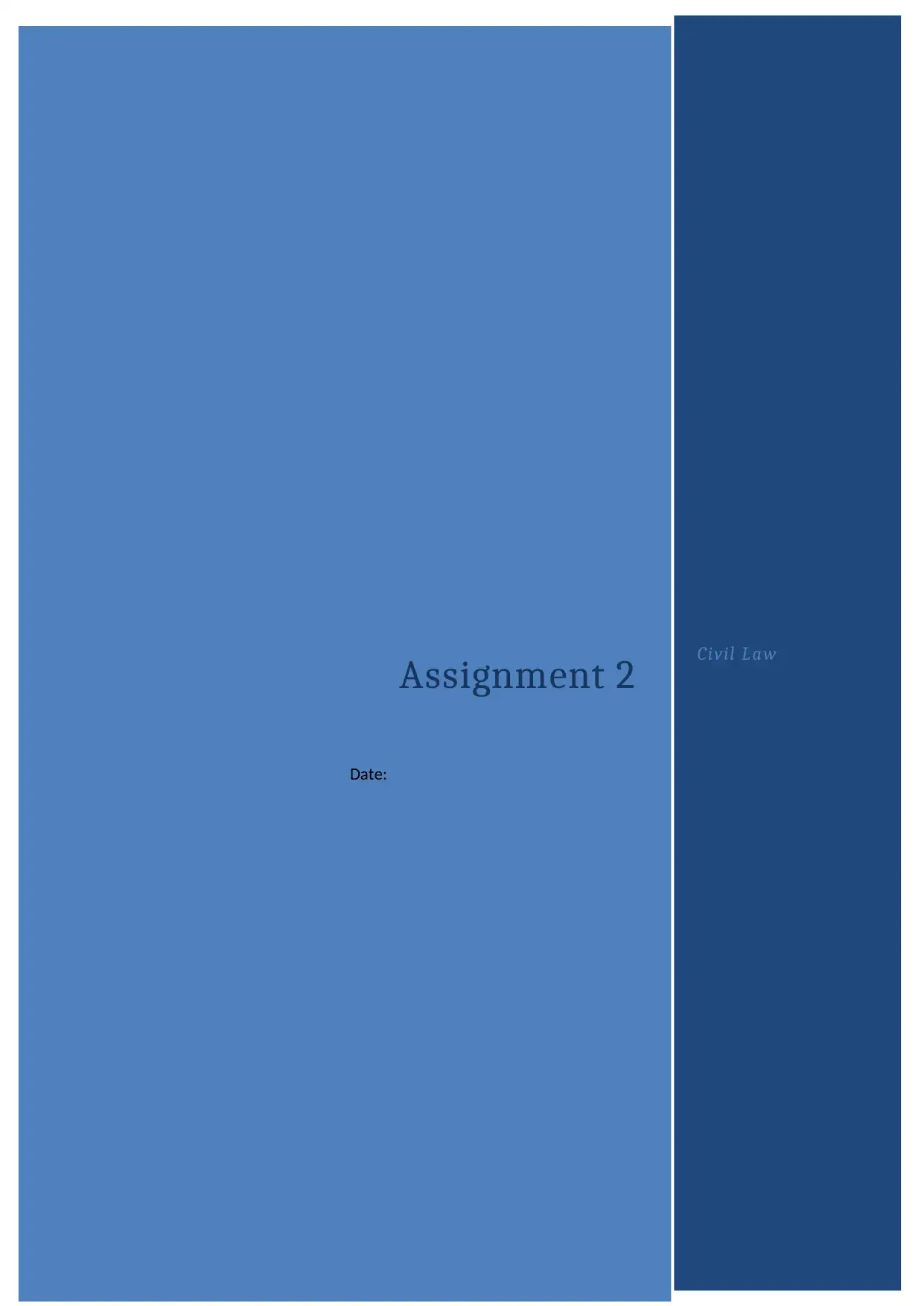
Assignment 2
Date:
Civil Law
Date:
Civil Law
Paraphrase This Document
Need a fresh take? Get an instant paraphrase of this document with our AI Paraphraser

Assignment 2
Table of Contents
Task 1....................................................................................................................................................2
Task 2....................................................................................................................................................5
Task 3....................................................................................................................................................7
Task 4..................................................................................................................................................10
Bibliography......................................................................................................................................13
1 | P a g e
Table of Contents
Task 1....................................................................................................................................................2
Task 2....................................................................................................................................................5
Task 3....................................................................................................................................................7
Task 4..................................................................................................................................................10
Bibliography......................................................................................................................................13
1 | P a g e
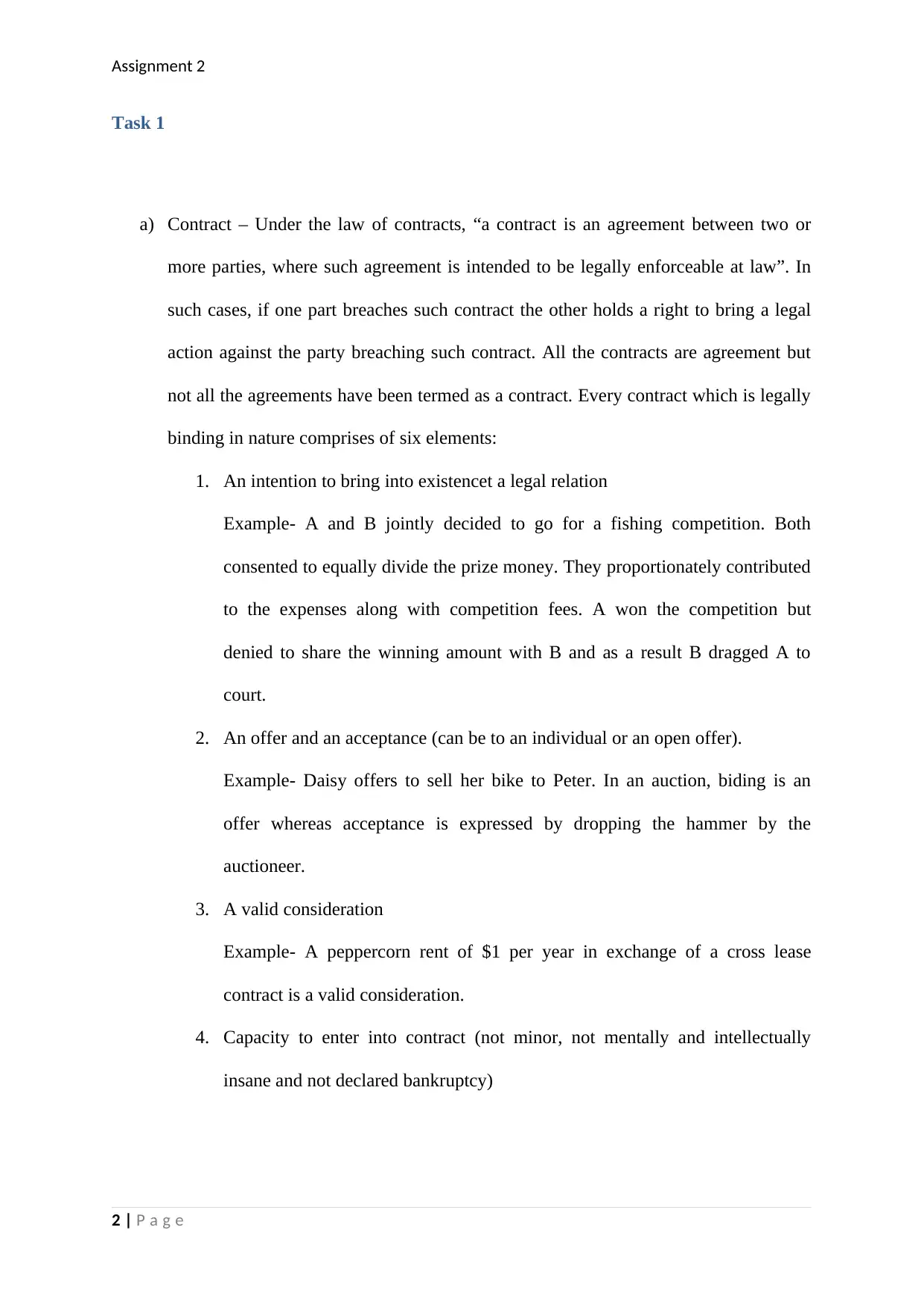
Assignment 2
Task 1
a) Contract – Under the law of contracts, “a contract is an agreement between two or
more parties, where such agreement is intended to be legally enforceable at law”. In
such cases, if one part breaches such contract the other holds a right to bring a legal
action against the party breaching such contract. All the contracts are agreement but
not all the agreements have been termed as a contract. Every contract which is legally
binding in nature comprises of six elements:
1. An intention to bring into existencet a legal relation
Example- A and B jointly decided to go for a fishing competition. Both
consented to equally divide the prize money. They proportionately contributed
to the expenses along with competition fees. A won the competition but
denied to share the winning amount with B and as a result B dragged A to
court.
2. An offer and an acceptance (can be to an individual or an open offer).
Example- Daisy offers to sell her bike to Peter. In an auction, biding is an
offer whereas acceptance is expressed by dropping the hammer by the
auctioneer.
3. A valid consideration
Example- A peppercorn rent of $1 per year in exchange of a cross lease
contract is a valid consideration.
4. Capacity to enter into contract (not minor, not mentally and intellectually
insane and not declared bankruptcy)
2 | P a g e
Task 1
a) Contract – Under the law of contracts, “a contract is an agreement between two or
more parties, where such agreement is intended to be legally enforceable at law”. In
such cases, if one part breaches such contract the other holds a right to bring a legal
action against the party breaching such contract. All the contracts are agreement but
not all the agreements have been termed as a contract. Every contract which is legally
binding in nature comprises of six elements:
1. An intention to bring into existencet a legal relation
Example- A and B jointly decided to go for a fishing competition. Both
consented to equally divide the prize money. They proportionately contributed
to the expenses along with competition fees. A won the competition but
denied to share the winning amount with B and as a result B dragged A to
court.
2. An offer and an acceptance (can be to an individual or an open offer).
Example- Daisy offers to sell her bike to Peter. In an auction, biding is an
offer whereas acceptance is expressed by dropping the hammer by the
auctioneer.
3. A valid consideration
Example- A peppercorn rent of $1 per year in exchange of a cross lease
contract is a valid consideration.
4. Capacity to enter into contract (not minor, not mentally and intellectually
insane and not declared bankruptcy)
2 | P a g e
⊘ This is a preview!⊘
Do you want full access?
Subscribe today to unlock all pages.

Trusted by 1+ million students worldwide
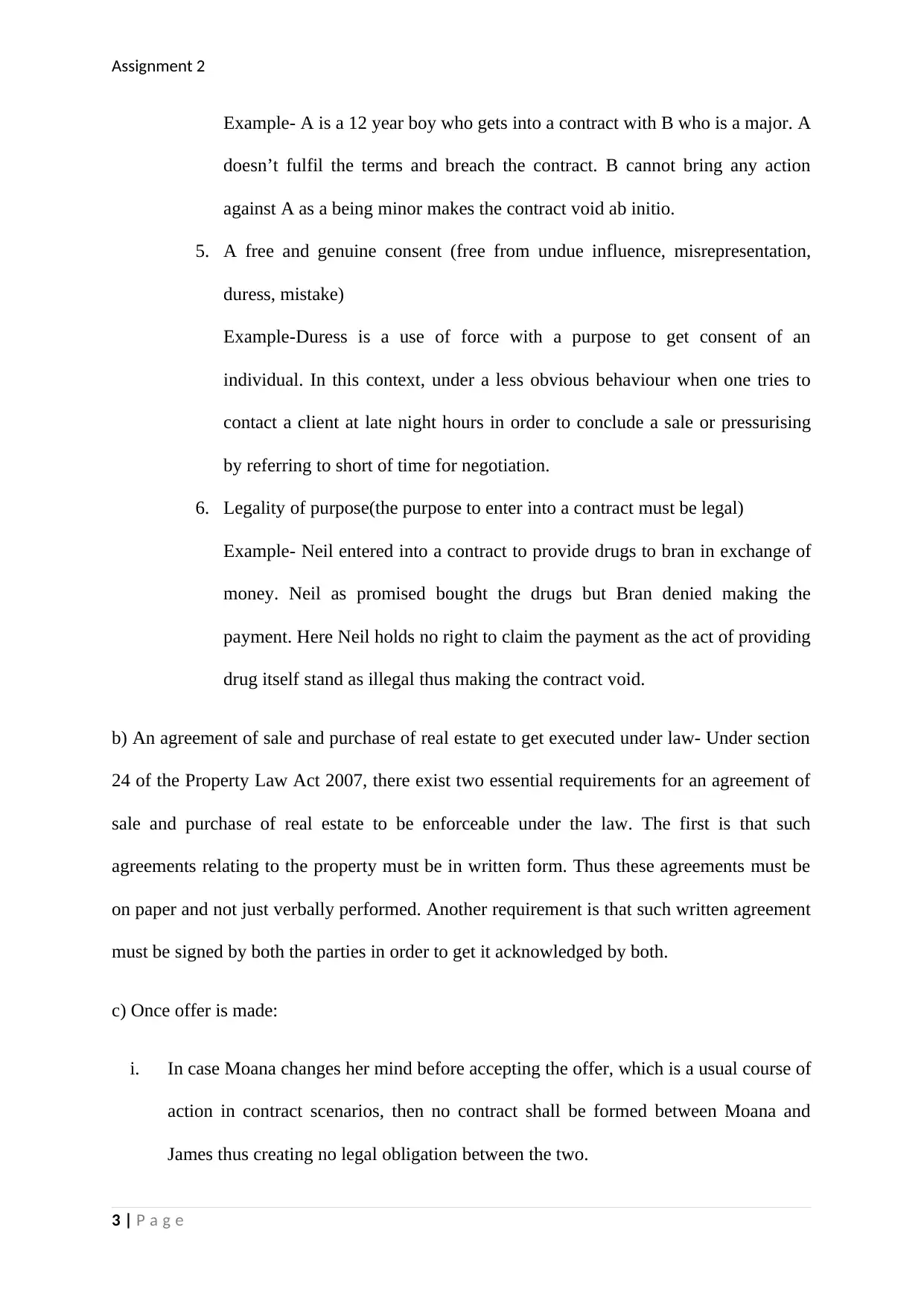
Assignment 2
Example- A is a 12 year boy who gets into a contract with B who is a major. A
doesn’t fulfil the terms and breach the contract. B cannot bring any action
against A as a being minor makes the contract void ab initio.
5. A free and genuine consent (free from undue influence, misrepresentation,
duress, mistake)
Example-Duress is a use of force with a purpose to get consent of an
individual. In this context, under a less obvious behaviour when one tries to
contact a client at late night hours in order to conclude a sale or pressurising
by referring to short of time for negotiation.
6. Legality of purpose(the purpose to enter into a contract must be legal)
Example- Neil entered into a contract to provide drugs to bran in exchange of
money. Neil as promised bought the drugs but Bran denied making the
payment. Here Neil holds no right to claim the payment as the act of providing
drug itself stand as illegal thus making the contract void.
b) An agreement of sale and purchase of real estate to get executed under law- Under section
24 of the Property Law Act 2007, there exist two essential requirements for an agreement of
sale and purchase of real estate to be enforceable under the law. The first is that such
agreements relating to the property must be in written form. Thus these agreements must be
on paper and not just verbally performed. Another requirement is that such written agreement
must be signed by both the parties in order to get it acknowledged by both.
c) Once offer is made:
i. In case Moana changes her mind before accepting the offer, which is a usual course of
action in contract scenarios, then no contract shall be formed between Moana and
James thus creating no legal obligation between the two.
3 | P a g e
Example- A is a 12 year boy who gets into a contract with B who is a major. A
doesn’t fulfil the terms and breach the contract. B cannot bring any action
against A as a being minor makes the contract void ab initio.
5. A free and genuine consent (free from undue influence, misrepresentation,
duress, mistake)
Example-Duress is a use of force with a purpose to get consent of an
individual. In this context, under a less obvious behaviour when one tries to
contact a client at late night hours in order to conclude a sale or pressurising
by referring to short of time for negotiation.
6. Legality of purpose(the purpose to enter into a contract must be legal)
Example- Neil entered into a contract to provide drugs to bran in exchange of
money. Neil as promised bought the drugs but Bran denied making the
payment. Here Neil holds no right to claim the payment as the act of providing
drug itself stand as illegal thus making the contract void.
b) An agreement of sale and purchase of real estate to get executed under law- Under section
24 of the Property Law Act 2007, there exist two essential requirements for an agreement of
sale and purchase of real estate to be enforceable under the law. The first is that such
agreements relating to the property must be in written form. Thus these agreements must be
on paper and not just verbally performed. Another requirement is that such written agreement
must be signed by both the parties in order to get it acknowledged by both.
c) Once offer is made:
i. In case Moana changes her mind before accepting the offer, which is a usual course of
action in contract scenarios, then no contract shall be formed between Moana and
James thus creating no legal obligation between the two.
3 | P a g e
Paraphrase This Document
Need a fresh take? Get an instant paraphrase of this document with our AI Paraphraser
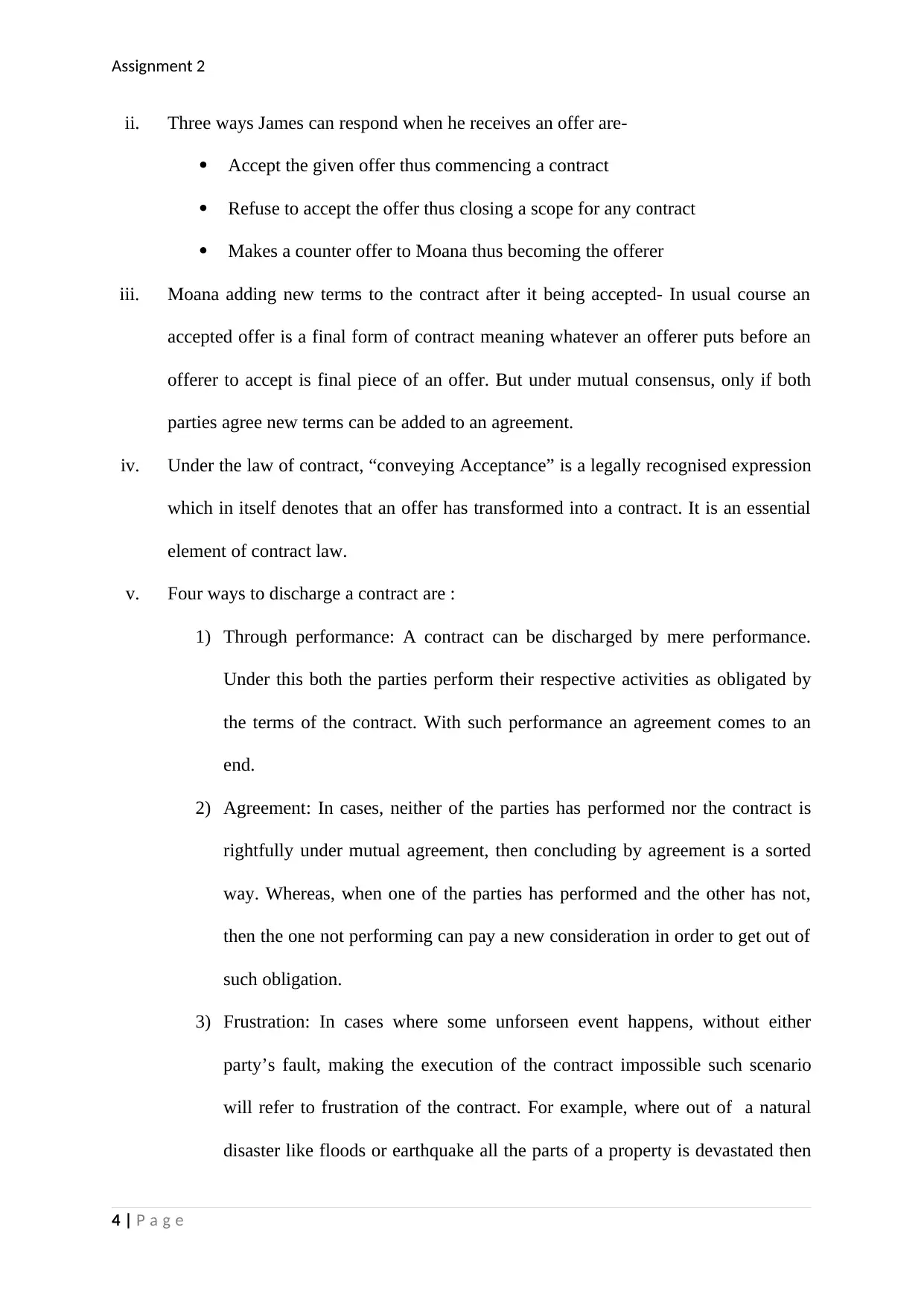
Assignment 2
ii. Three ways James can respond when he receives an offer are-
Accept the given offer thus commencing a contract
Refuse to accept the offer thus closing a scope for any contract
Makes a counter offer to Moana thus becoming the offerer
iii. Moana adding new terms to the contract after it being accepted- In usual course an
accepted offer is a final form of contract meaning whatever an offerer puts before an
offerer to accept is final piece of an offer. But under mutual consensus, only if both
parties agree new terms can be added to an agreement.
iv. Under the law of contract, “conveying Acceptance” is a legally recognised expression
which in itself denotes that an offer has transformed into a contract. It is an essential
element of contract law.
v. Four ways to discharge a contract are :
1) Through performance: A contract can be discharged by mere performance.
Under this both the parties perform their respective activities as obligated by
the terms of the contract. With such performance an agreement comes to an
end.
2) Agreement: In cases, neither of the parties has performed nor the contract is
rightfully under mutual agreement, then concluding by agreement is a sorted
way. Whereas, when one of the parties has performed and the other has not,
then the one not performing can pay a new consideration in order to get out of
such obligation.
3) Frustration: In cases where some unforseen event happens, without either
party’s fault, making the execution of the contract impossible such scenario
will refer to frustration of the contract. For example, where out of a natural
disaster like floods or earthquake all the parts of a property is devastated then
4 | P a g e
ii. Three ways James can respond when he receives an offer are-
Accept the given offer thus commencing a contract
Refuse to accept the offer thus closing a scope for any contract
Makes a counter offer to Moana thus becoming the offerer
iii. Moana adding new terms to the contract after it being accepted- In usual course an
accepted offer is a final form of contract meaning whatever an offerer puts before an
offerer to accept is final piece of an offer. But under mutual consensus, only if both
parties agree new terms can be added to an agreement.
iv. Under the law of contract, “conveying Acceptance” is a legally recognised expression
which in itself denotes that an offer has transformed into a contract. It is an essential
element of contract law.
v. Four ways to discharge a contract are :
1) Through performance: A contract can be discharged by mere performance.
Under this both the parties perform their respective activities as obligated by
the terms of the contract. With such performance an agreement comes to an
end.
2) Agreement: In cases, neither of the parties has performed nor the contract is
rightfully under mutual agreement, then concluding by agreement is a sorted
way. Whereas, when one of the parties has performed and the other has not,
then the one not performing can pay a new consideration in order to get out of
such obligation.
3) Frustration: In cases where some unforseen event happens, without either
party’s fault, making the execution of the contract impossible such scenario
will refer to frustration of the contract. For example, where out of a natural
disaster like floods or earthquake all the parts of a property is devastated then
4 | P a g e
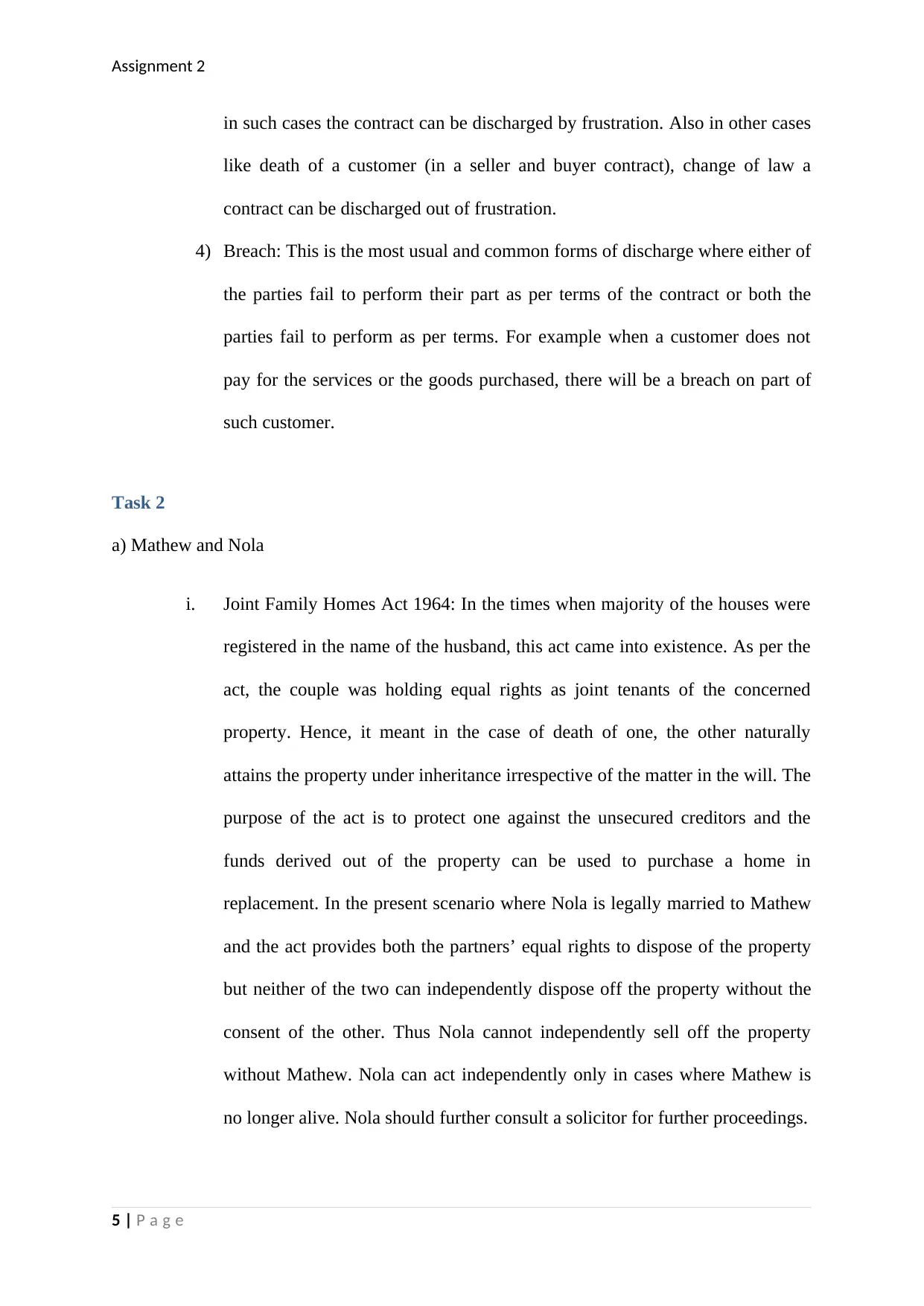
Assignment 2
in such cases the contract can be discharged by frustration. Also in other cases
like death of a customer (in a seller and buyer contract), change of law a
contract can be discharged out of frustration.
4) Breach: This is the most usual and common forms of discharge where either of
the parties fail to perform their part as per terms of the contract or both the
parties fail to perform as per terms. For example when a customer does not
pay for the services or the goods purchased, there will be a breach on part of
such customer.
Task 2
a) Mathew and Nola
i. Joint Family Homes Act 1964: In the times when majority of the houses were
registered in the name of the husband, this act came into existence. As per the
act, the couple was holding equal rights as joint tenants of the concerned
property. Hence, it meant in the case of death of one, the other naturally
attains the property under inheritance irrespective of the matter in the will. The
purpose of the act is to protect one against the unsecured creditors and the
funds derived out of the property can be used to purchase a home in
replacement. In the present scenario where Nola is legally married to Mathew
and the act provides both the partners’ equal rights to dispose of the property
but neither of the two can independently dispose off the property without the
consent of the other. Thus Nola cannot independently sell off the property
without Mathew. Nola can act independently only in cases where Mathew is
no longer alive. Nola should further consult a solicitor for further proceedings.
5 | P a g e
in such cases the contract can be discharged by frustration. Also in other cases
like death of a customer (in a seller and buyer contract), change of law a
contract can be discharged out of frustration.
4) Breach: This is the most usual and common forms of discharge where either of
the parties fail to perform their part as per terms of the contract or both the
parties fail to perform as per terms. For example when a customer does not
pay for the services or the goods purchased, there will be a breach on part of
such customer.
Task 2
a) Mathew and Nola
i. Joint Family Homes Act 1964: In the times when majority of the houses were
registered in the name of the husband, this act came into existence. As per the
act, the couple was holding equal rights as joint tenants of the concerned
property. Hence, it meant in the case of death of one, the other naturally
attains the property under inheritance irrespective of the matter in the will. The
purpose of the act is to protect one against the unsecured creditors and the
funds derived out of the property can be used to purchase a home in
replacement. In the present scenario where Nola is legally married to Mathew
and the act provides both the partners’ equal rights to dispose of the property
but neither of the two can independently dispose off the property without the
consent of the other. Thus Nola cannot independently sell off the property
without Mathew. Nola can act independently only in cases where Mathew is
no longer alive. Nola should further consult a solicitor for further proceedings.
5 | P a g e
⊘ This is a preview!⊘
Do you want full access?
Subscribe today to unlock all pages.

Trusted by 1+ million students worldwide
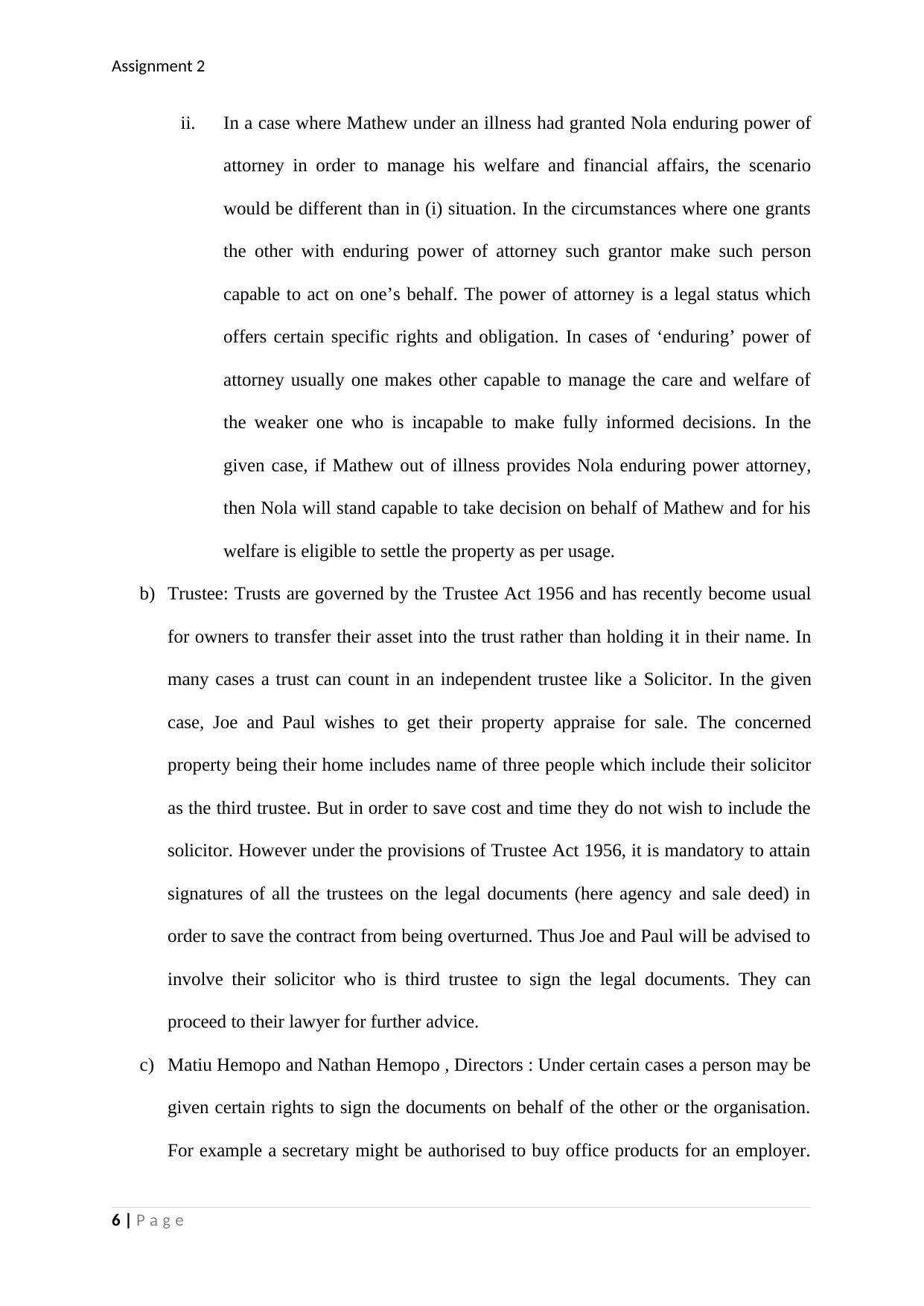
Assignment 2
ii. In a case where Mathew under an illness had granted Nola enduring power of
attorney in order to manage his welfare and financial affairs, the scenario
would be different than in (i) situation. In the circumstances where one grants
the other with enduring power of attorney such grantor make such person
capable to act on one’s behalf. The power of attorney is a legal status which
offers certain specific rights and obligation. In cases of ‘enduring’ power of
attorney usually one makes other capable to manage the care and welfare of
the weaker one who is incapable to make fully informed decisions. In the
given case, if Mathew out of illness provides Nola enduring power attorney,
then Nola will stand capable to take decision on behalf of Mathew and for his
welfare is eligible to settle the property as per usage.
b) Trustee: Trusts are governed by the Trustee Act 1956 and has recently become usual
for owners to transfer their asset into the trust rather than holding it in their name. In
many cases a trust can count in an independent trustee like a Solicitor. In the given
case, Joe and Paul wishes to get their property appraise for sale. The concerned
property being their home includes name of three people which include their solicitor
as the third trustee. But in order to save cost and time they do not wish to include the
solicitor. However under the provisions of Trustee Act 1956, it is mandatory to attain
signatures of all the trustees on the legal documents (here agency and sale deed) in
order to save the contract from being overturned. Thus Joe and Paul will be advised to
involve their solicitor who is third trustee to sign the legal documents. They can
proceed to their lawyer for further advice.
c) Matiu Hemopo and Nathan Hemopo , Directors : Under certain cases a person may be
given certain rights to sign the documents on behalf of the other or the organisation.
For example a secretary might be authorised to buy office products for an employer.
6 | P a g e
ii. In a case where Mathew under an illness had granted Nola enduring power of
attorney in order to manage his welfare and financial affairs, the scenario
would be different than in (i) situation. In the circumstances where one grants
the other with enduring power of attorney such grantor make such person
capable to act on one’s behalf. The power of attorney is a legal status which
offers certain specific rights and obligation. In cases of ‘enduring’ power of
attorney usually one makes other capable to manage the care and welfare of
the weaker one who is incapable to make fully informed decisions. In the
given case, if Mathew out of illness provides Nola enduring power attorney,
then Nola will stand capable to take decision on behalf of Mathew and for his
welfare is eligible to settle the property as per usage.
b) Trustee: Trusts are governed by the Trustee Act 1956 and has recently become usual
for owners to transfer their asset into the trust rather than holding it in their name. In
many cases a trust can count in an independent trustee like a Solicitor. In the given
case, Joe and Paul wishes to get their property appraise for sale. The concerned
property being their home includes name of three people which include their solicitor
as the third trustee. But in order to save cost and time they do not wish to include the
solicitor. However under the provisions of Trustee Act 1956, it is mandatory to attain
signatures of all the trustees on the legal documents (here agency and sale deed) in
order to save the contract from being overturned. Thus Joe and Paul will be advised to
involve their solicitor who is third trustee to sign the legal documents. They can
proceed to their lawyer for further advice.
c) Matiu Hemopo and Nathan Hemopo , Directors : Under certain cases a person may be
given certain rights to sign the documents on behalf of the other or the organisation.
For example a secretary might be authorised to buy office products for an employer.
6 | P a g e
Paraphrase This Document
Need a fresh take? Get an instant paraphrase of this document with our AI Paraphraser
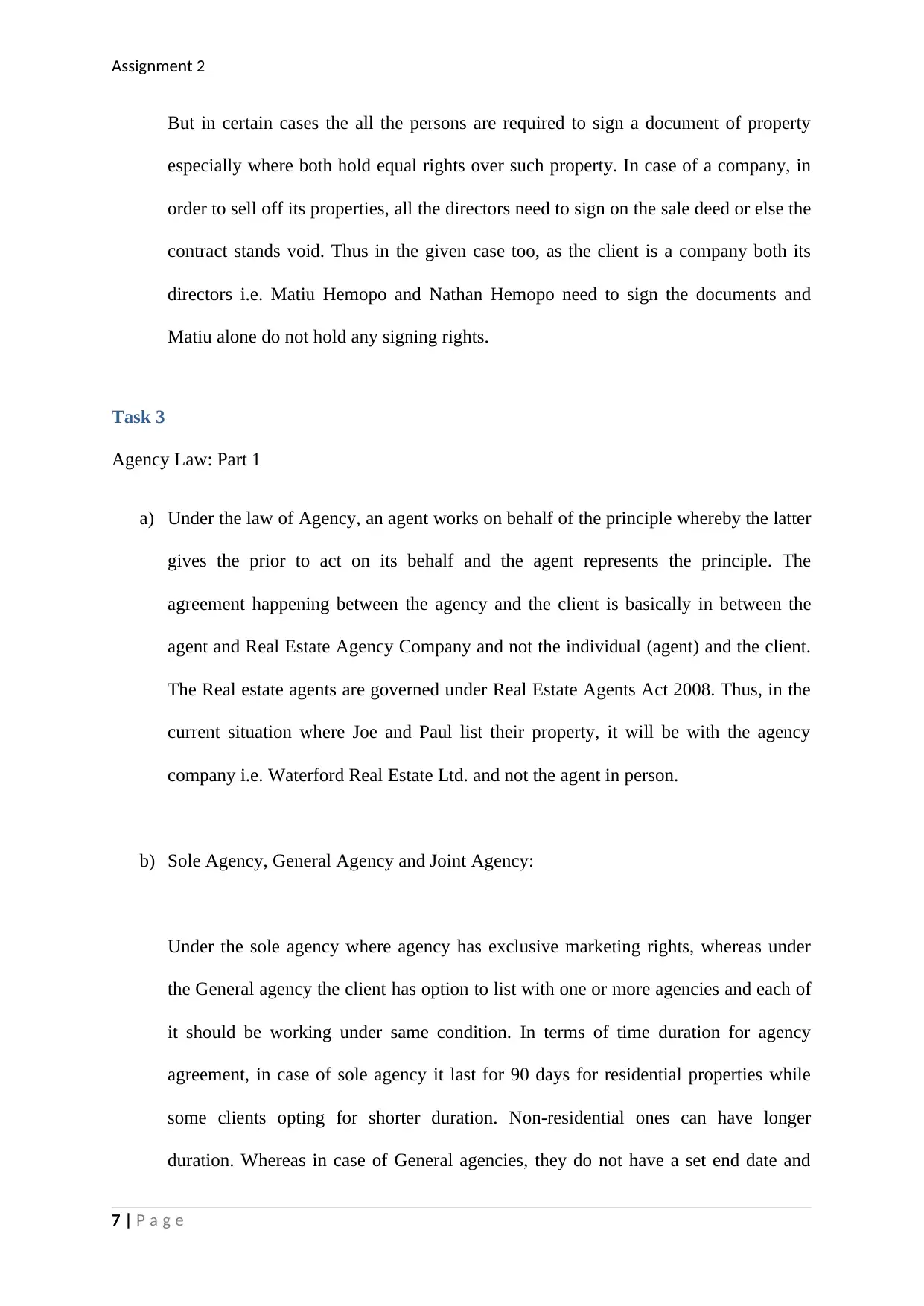
Assignment 2
But in certain cases the all the persons are required to sign a document of property
especially where both hold equal rights over such property. In case of a company, in
order to sell off its properties, all the directors need to sign on the sale deed or else the
contract stands void. Thus in the given case too, as the client is a company both its
directors i.e. Matiu Hemopo and Nathan Hemopo need to sign the documents and
Matiu alone do not hold any signing rights.
Task 3
Agency Law: Part 1
a) Under the law of Agency, an agent works on behalf of the principle whereby the latter
gives the prior to act on its behalf and the agent represents the principle. The
agreement happening between the agency and the client is basically in between the
agent and Real Estate Agency Company and not the individual (agent) and the client.
The Real estate agents are governed under Real Estate Agents Act 2008. Thus, in the
current situation where Joe and Paul list their property, it will be with the agency
company i.e. Waterford Real Estate Ltd. and not the agent in person.
b) Sole Agency, General Agency and Joint Agency:
Under the sole agency where agency has exclusive marketing rights, whereas under
the General agency the client has option to list with one or more agencies and each of
it should be working under same condition. In terms of time duration for agency
agreement, in case of sole agency it last for 90 days for residential properties while
some clients opting for shorter duration. Non-residential ones can have longer
duration. Whereas in case of General agencies, they do not have a set end date and
7 | P a g e
But in certain cases the all the persons are required to sign a document of property
especially where both hold equal rights over such property. In case of a company, in
order to sell off its properties, all the directors need to sign on the sale deed or else the
contract stands void. Thus in the given case too, as the client is a company both its
directors i.e. Matiu Hemopo and Nathan Hemopo need to sign the documents and
Matiu alone do not hold any signing rights.
Task 3
Agency Law: Part 1
a) Under the law of Agency, an agent works on behalf of the principle whereby the latter
gives the prior to act on its behalf and the agent represents the principle. The
agreement happening between the agency and the client is basically in between the
agent and Real Estate Agency Company and not the individual (agent) and the client.
The Real estate agents are governed under Real Estate Agents Act 2008. Thus, in the
current situation where Joe and Paul list their property, it will be with the agency
company i.e. Waterford Real Estate Ltd. and not the agent in person.
b) Sole Agency, General Agency and Joint Agency:
Under the sole agency where agency has exclusive marketing rights, whereas under
the General agency the client has option to list with one or more agencies and each of
it should be working under same condition. In terms of time duration for agency
agreement, in case of sole agency it last for 90 days for residential properties while
some clients opting for shorter duration. Non-residential ones can have longer
duration. Whereas in case of General agencies, they do not have a set end date and
7 | P a g e
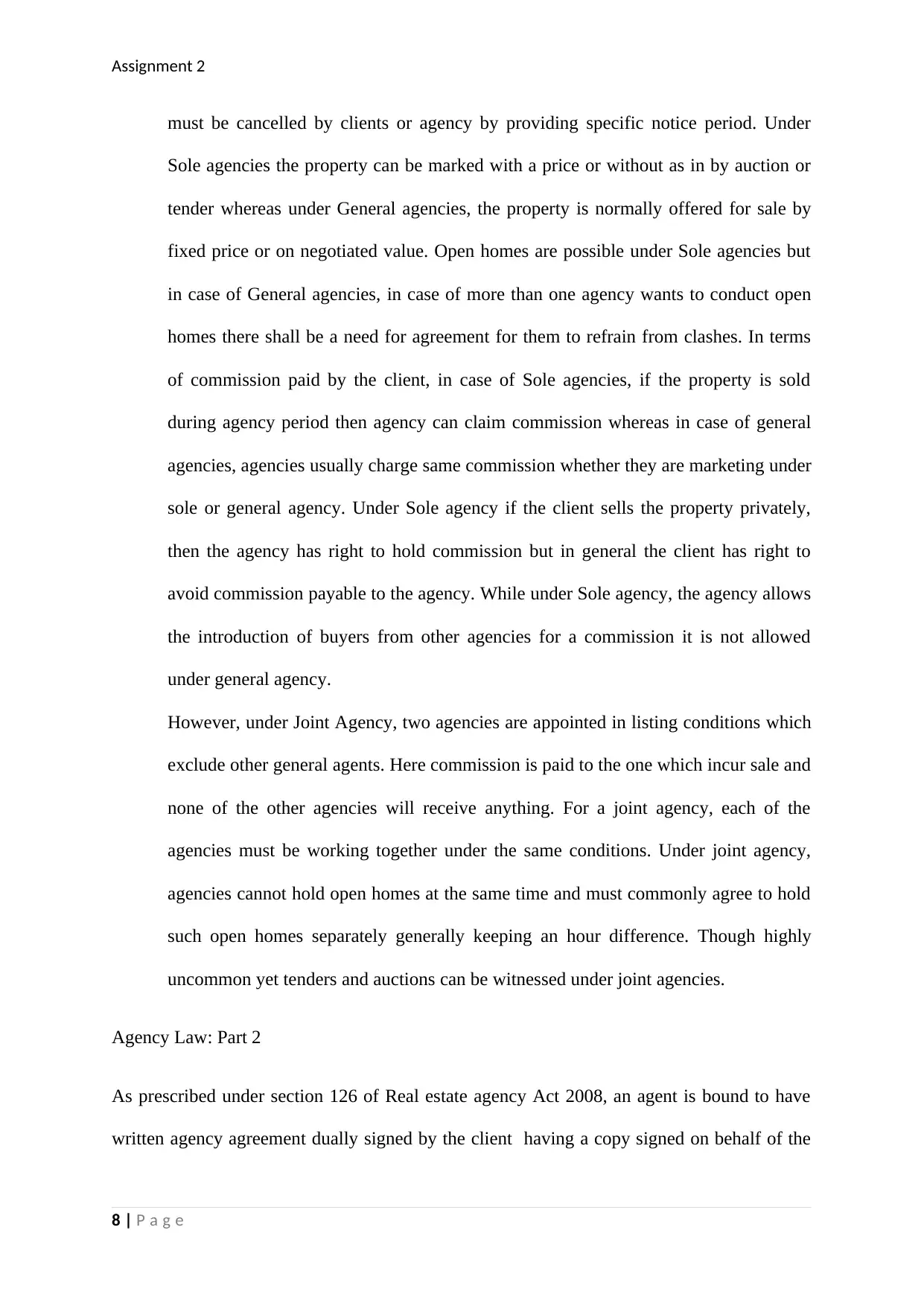
Assignment 2
must be cancelled by clients or agency by providing specific notice period. Under
Sole agencies the property can be marked with a price or without as in by auction or
tender whereas under General agencies, the property is normally offered for sale by
fixed price or on negotiated value. Open homes are possible under Sole agencies but
in case of General agencies, in case of more than one agency wants to conduct open
homes there shall be a need for agreement for them to refrain from clashes. In terms
of commission paid by the client, in case of Sole agencies, if the property is sold
during agency period then agency can claim commission whereas in case of general
agencies, agencies usually charge same commission whether they are marketing under
sole or general agency. Under Sole agency if the client sells the property privately,
then the agency has right to hold commission but in general the client has right to
avoid commission payable to the agency. While under Sole agency, the agency allows
the introduction of buyers from other agencies for a commission it is not allowed
under general agency.
However, under Joint Agency, two agencies are appointed in listing conditions which
exclude other general agents. Here commission is paid to the one which incur sale and
none of the other agencies will receive anything. For a joint agency, each of the
agencies must be working together under the same conditions. Under joint agency,
agencies cannot hold open homes at the same time and must commonly agree to hold
such open homes separately generally keeping an hour difference. Though highly
uncommon yet tenders and auctions can be witnessed under joint agencies.
Agency Law: Part 2
As prescribed under section 126 of Real estate agency Act 2008, an agent is bound to have
written agency agreement dually signed by the client having a copy signed on behalf of the
8 | P a g e
must be cancelled by clients or agency by providing specific notice period. Under
Sole agencies the property can be marked with a price or without as in by auction or
tender whereas under General agencies, the property is normally offered for sale by
fixed price or on negotiated value. Open homes are possible under Sole agencies but
in case of General agencies, in case of more than one agency wants to conduct open
homes there shall be a need for agreement for them to refrain from clashes. In terms
of commission paid by the client, in case of Sole agencies, if the property is sold
during agency period then agency can claim commission whereas in case of general
agencies, agencies usually charge same commission whether they are marketing under
sole or general agency. Under Sole agency if the client sells the property privately,
then the agency has right to hold commission but in general the client has right to
avoid commission payable to the agency. While under Sole agency, the agency allows
the introduction of buyers from other agencies for a commission it is not allowed
under general agency.
However, under Joint Agency, two agencies are appointed in listing conditions which
exclude other general agents. Here commission is paid to the one which incur sale and
none of the other agencies will receive anything. For a joint agency, each of the
agencies must be working together under the same conditions. Under joint agency,
agencies cannot hold open homes at the same time and must commonly agree to hold
such open homes separately generally keeping an hour difference. Though highly
uncommon yet tenders and auctions can be witnessed under joint agencies.
Agency Law: Part 2
As prescribed under section 126 of Real estate agency Act 2008, an agent is bound to have
written agency agreement dually signed by the client having a copy signed on behalf of the
8 | P a g e
⊘ This is a preview!⊘
Do you want full access?
Subscribe today to unlock all pages.

Trusted by 1+ million students worldwide
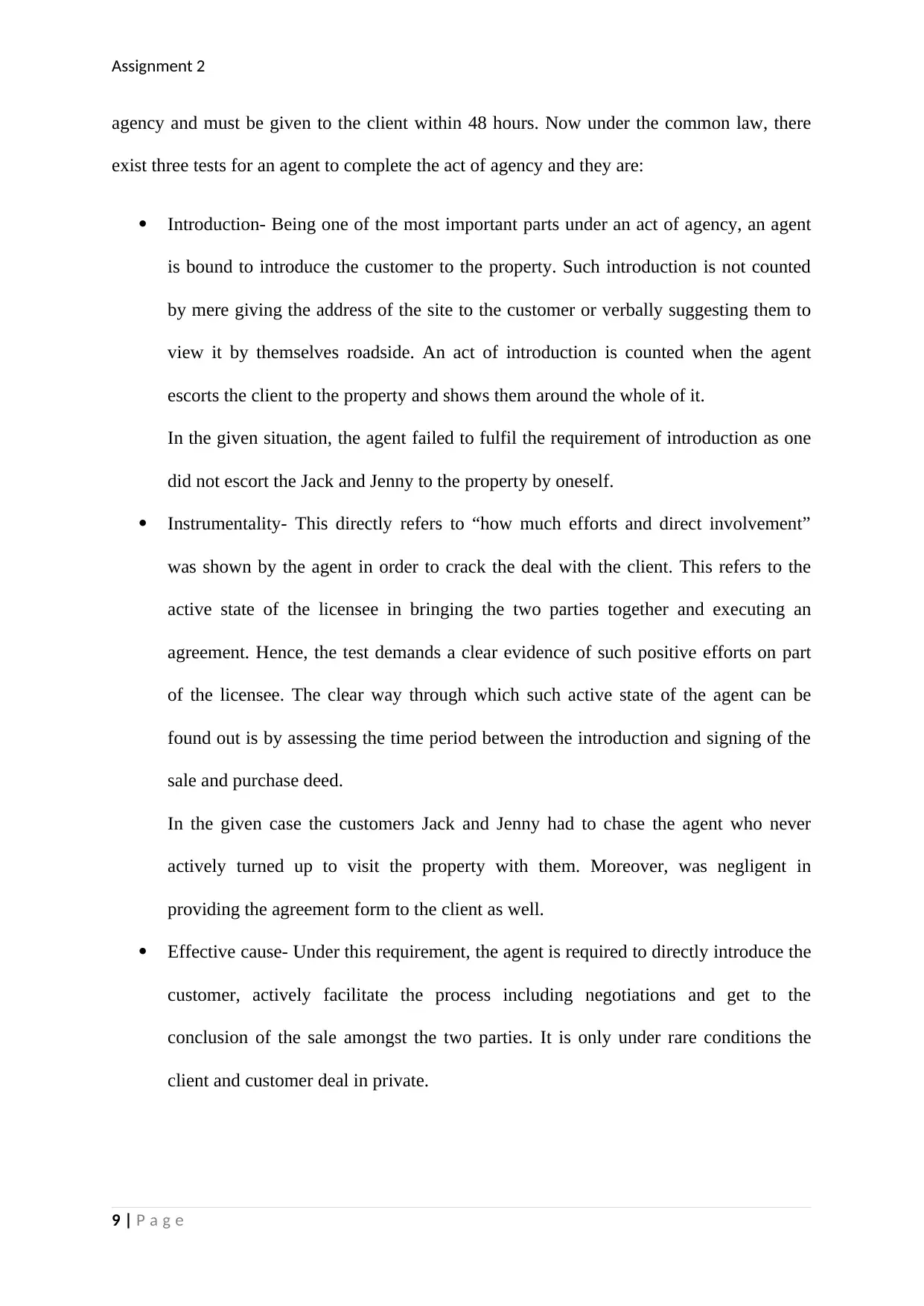
Assignment 2
agency and must be given to the client within 48 hours. Now under the common law, there
exist three tests for an agent to complete the act of agency and they are:
Introduction- Being one of the most important parts under an act of agency, an agent
is bound to introduce the customer to the property. Such introduction is not counted
by mere giving the address of the site to the customer or verbally suggesting them to
view it by themselves roadside. An act of introduction is counted when the agent
escorts the client to the property and shows them around the whole of it.
In the given situation, the agent failed to fulfil the requirement of introduction as one
did not escort the Jack and Jenny to the property by oneself.
Instrumentality- This directly refers to “how much efforts and direct involvement”
was shown by the agent in order to crack the deal with the client. This refers to the
active state of the licensee in bringing the two parties together and executing an
agreement. Hence, the test demands a clear evidence of such positive efforts on part
of the licensee. The clear way through which such active state of the agent can be
found out is by assessing the time period between the introduction and signing of the
sale and purchase deed.
In the given case the customers Jack and Jenny had to chase the agent who never
actively turned up to visit the property with them. Moreover, was negligent in
providing the agreement form to the client as well.
Effective cause- Under this requirement, the agent is required to directly introduce the
customer, actively facilitate the process including negotiations and get to the
conclusion of the sale amongst the two parties. It is only under rare conditions the
client and customer deal in private.
9 | P a g e
agency and must be given to the client within 48 hours. Now under the common law, there
exist three tests for an agent to complete the act of agency and they are:
Introduction- Being one of the most important parts under an act of agency, an agent
is bound to introduce the customer to the property. Such introduction is not counted
by mere giving the address of the site to the customer or verbally suggesting them to
view it by themselves roadside. An act of introduction is counted when the agent
escorts the client to the property and shows them around the whole of it.
In the given situation, the agent failed to fulfil the requirement of introduction as one
did not escort the Jack and Jenny to the property by oneself.
Instrumentality- This directly refers to “how much efforts and direct involvement”
was shown by the agent in order to crack the deal with the client. This refers to the
active state of the licensee in bringing the two parties together and executing an
agreement. Hence, the test demands a clear evidence of such positive efforts on part
of the licensee. The clear way through which such active state of the agent can be
found out is by assessing the time period between the introduction and signing of the
sale and purchase deed.
In the given case the customers Jack and Jenny had to chase the agent who never
actively turned up to visit the property with them. Moreover, was negligent in
providing the agreement form to the client as well.
Effective cause- Under this requirement, the agent is required to directly introduce the
customer, actively facilitate the process including negotiations and get to the
conclusion of the sale amongst the two parties. It is only under rare conditions the
client and customer deal in private.
9 | P a g e
Paraphrase This Document
Need a fresh take? Get an instant paraphrase of this document with our AI Paraphraser
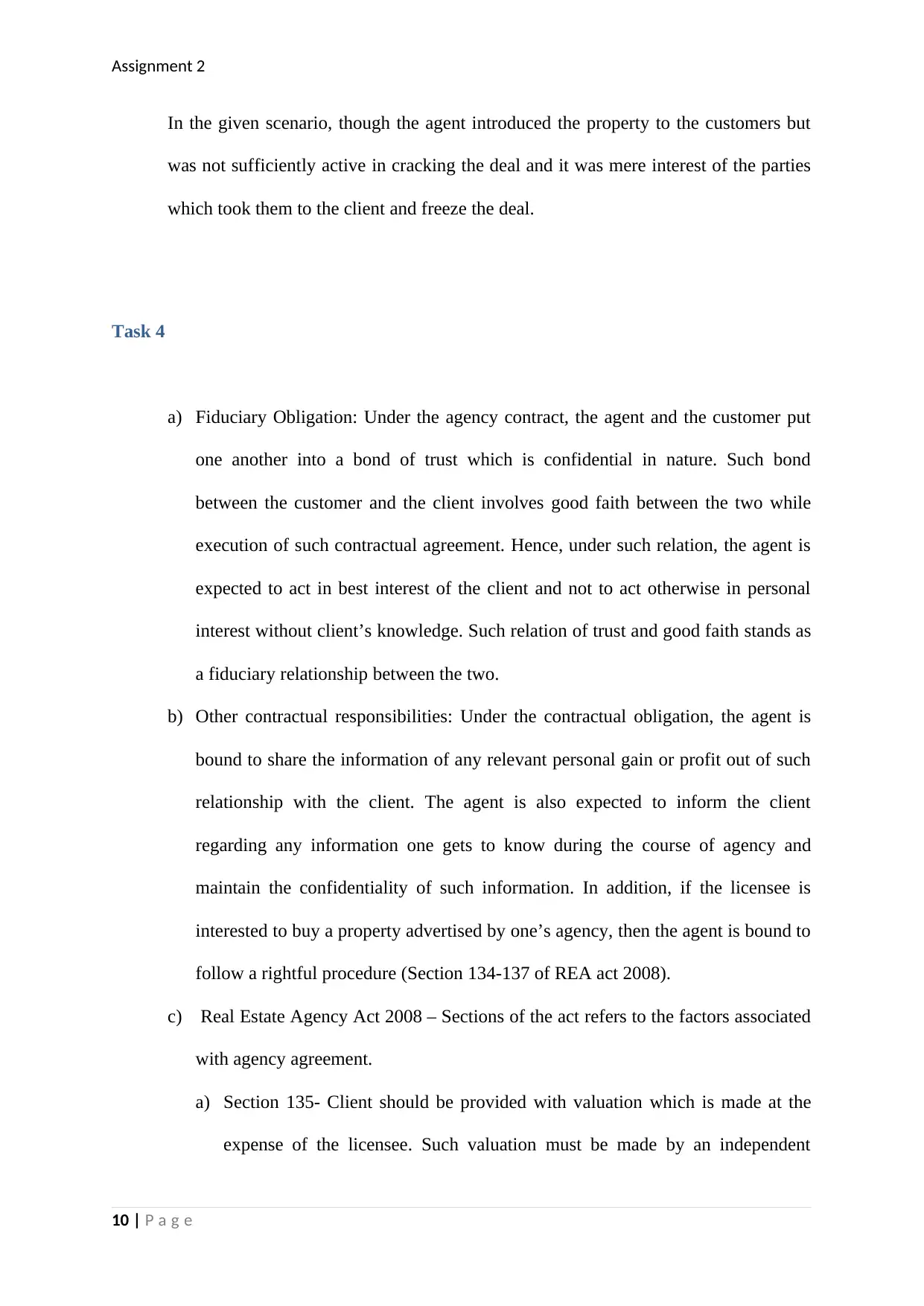
Assignment 2
In the given scenario, though the agent introduced the property to the customers but
was not sufficiently active in cracking the deal and it was mere interest of the parties
which took them to the client and freeze the deal.
Task 4
a) Fiduciary Obligation: Under the agency contract, the agent and the customer put
one another into a bond of trust which is confidential in nature. Such bond
between the customer and the client involves good faith between the two while
execution of such contractual agreement. Hence, under such relation, the agent is
expected to act in best interest of the client and not to act otherwise in personal
interest without client’s knowledge. Such relation of trust and good faith stands as
a fiduciary relationship between the two.
b) Other contractual responsibilities: Under the contractual obligation, the agent is
bound to share the information of any relevant personal gain or profit out of such
relationship with the client. The agent is also expected to inform the client
regarding any information one gets to know during the course of agency and
maintain the confidentiality of such information. In addition, if the licensee is
interested to buy a property advertised by one’s agency, then the agent is bound to
follow a rightful procedure (Section 134-137 of REA act 2008).
c) Real Estate Agency Act 2008 – Sections of the act refers to the factors associated
with agency agreement.
a) Section 135- Client should be provided with valuation which is made at the
expense of the licensee. Such valuation must be made by an independent
10 | P a g e
In the given scenario, though the agent introduced the property to the customers but
was not sufficiently active in cracking the deal and it was mere interest of the parties
which took them to the client and freeze the deal.
Task 4
a) Fiduciary Obligation: Under the agency contract, the agent and the customer put
one another into a bond of trust which is confidential in nature. Such bond
between the customer and the client involves good faith between the two while
execution of such contractual agreement. Hence, under such relation, the agent is
expected to act in best interest of the client and not to act otherwise in personal
interest without client’s knowledge. Such relation of trust and good faith stands as
a fiduciary relationship between the two.
b) Other contractual responsibilities: Under the contractual obligation, the agent is
bound to share the information of any relevant personal gain or profit out of such
relationship with the client. The agent is also expected to inform the client
regarding any information one gets to know during the course of agency and
maintain the confidentiality of such information. In addition, if the licensee is
interested to buy a property advertised by one’s agency, then the agent is bound to
follow a rightful procedure (Section 134-137 of REA act 2008).
c) Real Estate Agency Act 2008 – Sections of the act refers to the factors associated
with agency agreement.
a) Section 135- Client should be provided with valuation which is made at the
expense of the licensee. Such valuation must be made by an independent
10 | P a g e
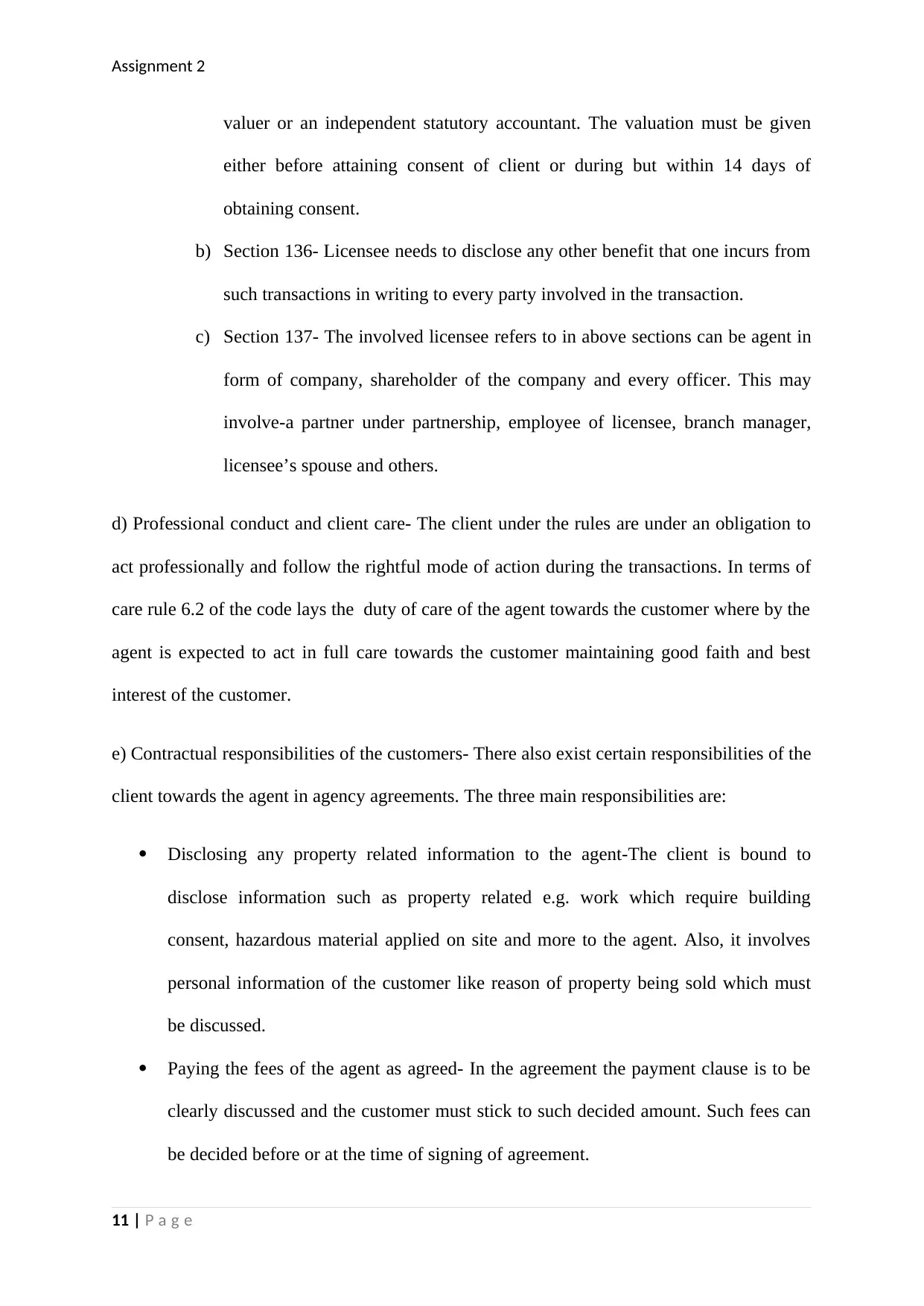
Assignment 2
valuer or an independent statutory accountant. The valuation must be given
either before attaining consent of client or during but within 14 days of
obtaining consent.
b) Section 136- Licensee needs to disclose any other benefit that one incurs from
such transactions in writing to every party involved in the transaction.
c) Section 137- The involved licensee refers to in above sections can be agent in
form of company, shareholder of the company and every officer. This may
involve-a partner under partnership, employee of licensee, branch manager,
licensee’s spouse and others.
d) Professional conduct and client care- The client under the rules are under an obligation to
act professionally and follow the rightful mode of action during the transactions. In terms of
care rule 6.2 of the code lays the duty of care of the agent towards the customer where by the
agent is expected to act in full care towards the customer maintaining good faith and best
interest of the customer.
e) Contractual responsibilities of the customers- There also exist certain responsibilities of the
client towards the agent in agency agreements. The three main responsibilities are:
Disclosing any property related information to the agent-The client is bound to
disclose information such as property related e.g. work which require building
consent, hazardous material applied on site and more to the agent. Also, it involves
personal information of the customer like reason of property being sold which must
be discussed.
Paying the fees of the agent as agreed- In the agreement the payment clause is to be
clearly discussed and the customer must stick to such decided amount. Such fees can
be decided before or at the time of signing of agreement.
11 | P a g e
valuer or an independent statutory accountant. The valuation must be given
either before attaining consent of client or during but within 14 days of
obtaining consent.
b) Section 136- Licensee needs to disclose any other benefit that one incurs from
such transactions in writing to every party involved in the transaction.
c) Section 137- The involved licensee refers to in above sections can be agent in
form of company, shareholder of the company and every officer. This may
involve-a partner under partnership, employee of licensee, branch manager,
licensee’s spouse and others.
d) Professional conduct and client care- The client under the rules are under an obligation to
act professionally and follow the rightful mode of action during the transactions. In terms of
care rule 6.2 of the code lays the duty of care of the agent towards the customer where by the
agent is expected to act in full care towards the customer maintaining good faith and best
interest of the customer.
e) Contractual responsibilities of the customers- There also exist certain responsibilities of the
client towards the agent in agency agreements. The three main responsibilities are:
Disclosing any property related information to the agent-The client is bound to
disclose information such as property related e.g. work which require building
consent, hazardous material applied on site and more to the agent. Also, it involves
personal information of the customer like reason of property being sold which must
be discussed.
Paying the fees of the agent as agreed- In the agreement the payment clause is to be
clearly discussed and the customer must stick to such decided amount. Such fees can
be decided before or at the time of signing of agreement.
11 | P a g e
⊘ This is a preview!⊘
Do you want full access?
Subscribe today to unlock all pages.

Trusted by 1+ million students worldwide
1 out of 14
Related Documents
Your All-in-One AI-Powered Toolkit for Academic Success.
+13062052269
info@desklib.com
Available 24*7 on WhatsApp / Email
![[object Object]](/_next/static/media/star-bottom.7253800d.svg)
Unlock your academic potential
Copyright © 2020–2026 A2Z Services. All Rights Reserved. Developed and managed by ZUCOL.




